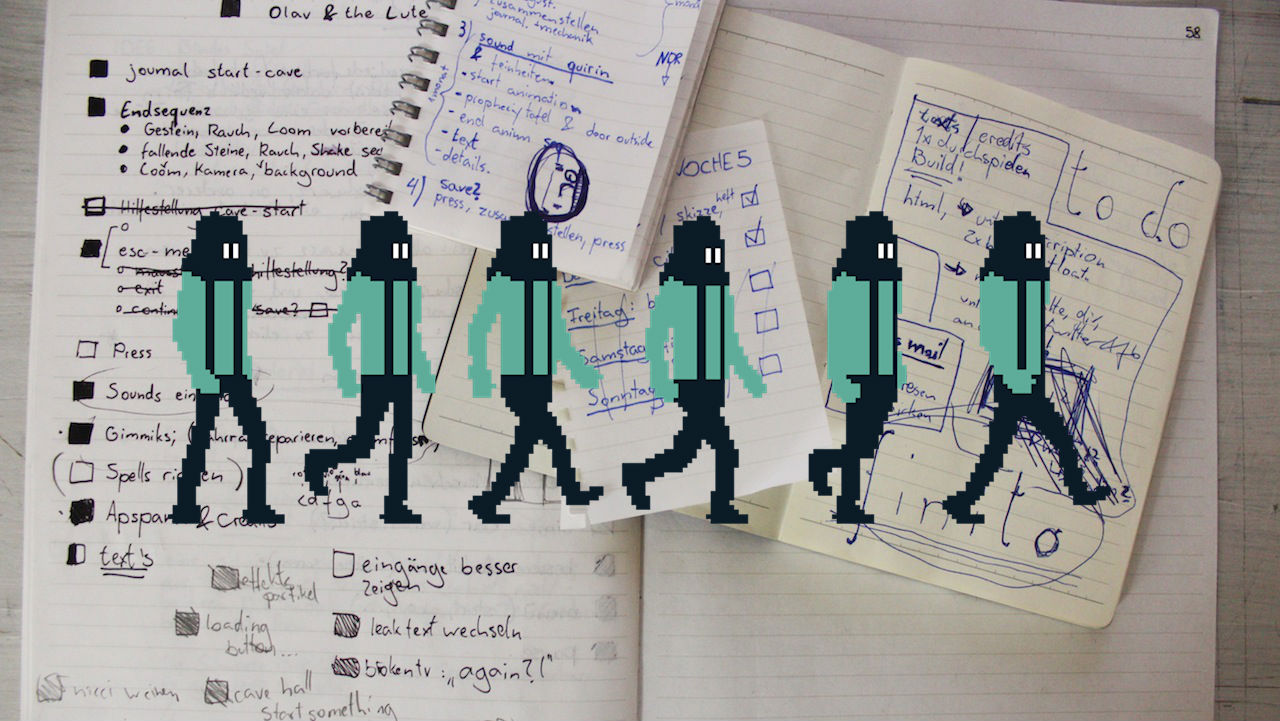ANIMAL’s feature Game Plan asks video game developers to share a bit about their process and some working images from the creation of a recent game. This week, we spoke with Shelly Alon about Olav & the Lute, a game about gods and a magic musical instrument.
Shelly Alon is a man. He lived the first half of his life in Israel, but has been in Hamburg, Germany for some time. It seems he’s used to people on the internet assuming he’s female, and he’s worried about disappointing his first-ever interviewer. But while it’s true that it would have been nice to interview a female game developer for once, Olav & the Lute stands on its own merits.

Olav is a brief, relatively traditional point-and-click adventure game — the kind you played as a kid in the ’90s if your parents had a decent PC and they needed a babysitter for a few months. One of these games in particular, a lesser-known LucasArts title called Loom, inspired Alon and his main co-creator, Daniel von Appen. Alon tells ANIMAL:
I think it was that you don’t know quite what you had to do. It’s not about the story all in all, it’s about this new way of interacting with objects that I think puts the player in a position where he wasn’t before. And I think that’s what stuck in Daniel’s head when he played [Loom] and suggested this mechanic for Olav & the Lute.

Both games have a musical element and, for some reason, a mystical, enshrined weaving loom. The loom itself shares plenty in common with the games: they weave a story that players need to bring to life. In Olav, the eponymous protagonist is dropped into the world by enigmatic gods, promptly happens on a magic lute, and sets about doing the only thing it appears there is for him to do: awaken the mysterious loom. The gods who send Olav on this quest never issue a single instruction, and likewise Alon and von Appen included no tutorials or hints. Alon says:
It doesn’t take a god to awaken it. A god only puts you, the player, or Olav, into the world, and he doesn’t tell you what to do. You stumble across it by mistake, or by boredom. But it’s through your actions that you do something. I kept the ending mysterious. You don’t know if you save the world or destroy it, or whatever, because I don’t know either. It’s just a broken world. It was intended to leave the player a bit in the dark.
By clicking around the environment you learn new songs, and playing those songs forward or backward has different effects, like heating/freezing or destroying/repairing. The game’s subtle and emotive music was created by a classmate of Alon’s, Quirin Nebas, who got it “just perfect,” Alon says.

While Nebas did the sound and von Appen took care of the programming, Alon created all the art. Daniel’s brother, Johann von Appen, worked on Olav for a time as well. None had ever made another game before, and Alon says they had no idea what they were doing. When the game was complete, Alon visited a course two game developers were teaching at his university and he was blown away by how organized their process was. Alon says:
Over time we rebuilt everything again and again because it wasn’t good enough for what we wanted. And, to be honest, when we finished, it wasn’t good enough. The game could be so much more, but we decided to bring it to an end because it was a bit too much for us for a first game, I think. That’s why the game’s actually broken. The game is not perfect, and not, I would say, a really good game. It’s a nice game, but it could have been more.

Alon doesn’t even think of himself as an artist. He’s studying design at the Hamburg University of Applied Sciences. When he designed the look for Olav he had just started watching the cartoon Adventure Time, and he was heavily inspired by another well-known game, Superbrothers’ Sword and Sworcery: EP. He was thrilled when reviewers noted the visual similarities. He and von Appen were also surprised when 10,000 people, far exceeding their initial hope of maybe 500, played Olav. Some of those players have complained that the use of the word “fuck” in the game ruins its atmosphere, which surprised Alon—and it was almost much worse:
Danny made the placeholder text and it was only like “fuck fuck motherfuck flower fuck” and everything. And in the initial release I forgot to redo one or two elements. So you would go there and you would click on a flower, I think, and Olav would say, “Fucking flower. Fuck.”

Given the regret in Alon’s voice when he discusses Olav, you might think the game is a mess. But the brief, mysterious experience has some magic to it. Alon says:
I hope most players are like my 10-year-old cousin. He is living in Israel, and when I talked to him he was so enthusiastic about the game. And even though it doesn’t have a save functionality, and he didn’t figure everything out in the first try, he kept going and going and playing everything from the start. And I was so happy when I heard it, because it reminded me of when I was young. So I hope most players are fascinated by the world, that it’s just nice to be there and think about all the secrets that might be there.
Olav & the Lute is available for free to download or play from olavandthelute.com. Alon is learning to program and hopes to release his next game, Partyrs, on iOS this summer.



